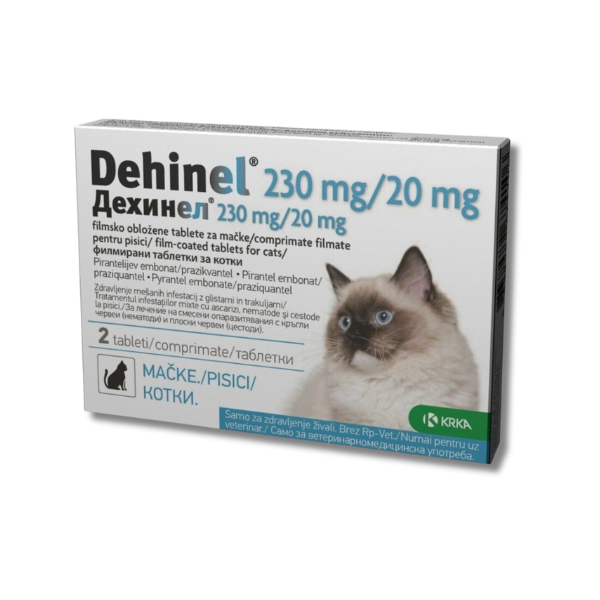Dehinel for cats
Dehinel Tablet for Cats – For the Treatment and Prevention of Helminthiasis
Composition and Form:
The anthelmintic preparation for cats contains the following active ingredients per tablet: 230 mg of pyrantel embonate and 20 mg of praziquantel. Inactive components include corn starch, microcrystalline cellulose, povidone, 230 mg colloidal anhydrous silica, hypromellose, polyethylene glycol 4000, and titanium dioxide.
Dehinel for cats is a film-coated, biconvex, oval tablet, white to off-white in color, scored on one side. It is available in blister packs of 2 tablets, packaged in boxes containing 1 or 2 blisters. Each box includes instructions for use.
Pharmacological Properties:
Dehinel tablets for cats belong to the group of combined anthelmintics. The product has a broad spectrum of anthelmintic effects against both round and tapeworms in cats, including:
-
Toxocara cati (syn. mystax)
-
Toxascaris leonina
-
Ancylostoma tubaeforme
-
Ancylostoma braziliense
-
Echinococcus multilocularis
-
Dipylidium caninum
-
Joyeuxiella pasqualei
Praziquantel acts by depolarizing neuromuscular ganglion blockers, disrupting glucose transport and microtubular function in cestodes, leading to impaired innervation, paralysis, and death of the parasite. It is rapidly absorbed in the intestines, distributed in organs and tissues, and excreted mainly in metabolized form via urine.
Pyrantel embonate has a potent nematocidal effect, increasing cell membrane permeability, causing irreversible paralysis and muscular contraction in nematodes. It is partially absorbed in the intestines and primarily excreted in feces.
According to toxicity classification (Class 4 under GOST 12.1.007-76), it is considered a low-risk substance and, at recommended doses, has no embryotoxic, teratogenic, or sensitizing effects. It is well-tolerated by cats of various breeds and ages.
Indications:
Prescribed for cats for both therapeutic and preventive treatment of nematodes (toxocariasis, toxascarosis, ancylostomiasis) and cestodiasis (taeniasis, dipylidiasis, echinococcosis, mesocestoidosis).
Dosage and Administration:
The dose is 1 tablet per 4 kg of body weight (equivalent to 5 mg praziquantel and 57.5 mg pyrantel embonate per 1 kg body weight):
| Cat Weight (kg) | Tablets |
|---|---|
| 1.0–2.0 | ½ |
| 2.1–4.0 | 1 |
| 4.1–6.0 | 1½ |
| 6.1–8.0 | 2 |
Dehelminthization using Dehinel starts from 3 weeks of age. The tablet is administered orally once, preferably in the morning with a small amount of food. No prior fasting or use of laxatives is required.
For therapeutic use: treat according to indications.
For preventive use: treat quarterly using the same dosage.
No symptoms have been identified with overdose.
In case of significant overdose, gastrointestinal disorders and vomiting may occur.
There were no specific effects observed at first use or when treatment was interrupted.
If the repeat treatment schedule is missed, resume the same dosage as before.
Side Effects:
Usually well-tolerated. Rarely, sensitive animals may show individual intolerance to components (hypersalivation, diarrhea, or vomiting). These symptoms are temporary and do not require medication.
Contraindications:
Increased sensitivity to any component (including history).
Do not use in kittens under 1 kg or younger than 3 weeks, or in pregnant cats.
Special Instructions:
Do not use with piperazine-containing medications, as efficacy may decrease.
Not intended for use in food-producing animals.
Storage Conditions:
Store in original sealed packaging in a dry, shaded, and child- and animal-proof location, separate from food, at 0°C to 25°C. Shelf life is 2 years unopened. A halved tablet is good for 1 month.

